
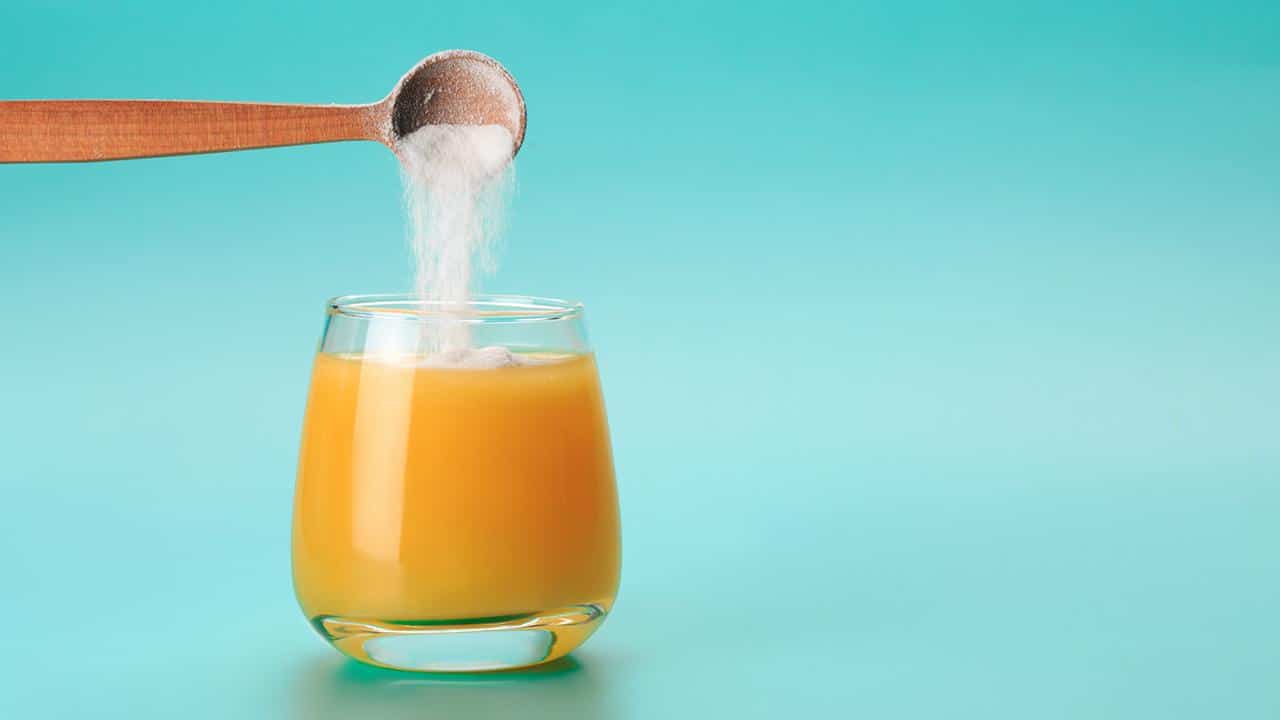
efetova / iStock / Getty Images
No one is immune to the effects of aging, and one consequence of getting older is less collagen production.
Collagen accounts for a full third of all the protein in your body. It affects more systems than most of us appreciate, and the benefits of collagen include youthful skin, strong bones, and better heart functioning. But as the years creep up, can you recapture your youth with a collagen protein supplement? We’ve assessed the research to share the best collagen supplements available today.
What are the Benefits of Collagen?
As the most abundant protein in the body, collagen is a primary component of your connective tissues. It forms the support structure for your tendons, ligaments, muscles, skin, and even bones.
Your body produces collagen naturally, but production starts to drop as you age. Lower levels can trigger many of the common signs of aging, including fine lines and wrinkles, joint pain, and weaker bones.
One way to combat this decrease is through collagen supplements. Just like a daily vitamin subscription, these supplements are meant to help provide your body with the nutrients it needs to function at its best. Most collagen supplements are made by simmering animal bones or fish skins for hours to break them down into base components called peptides. However, plant-based sources of collagen, like plant-based protein powders, are just as beneficial.
Most collagen supplements come as a powder and are designed to be dissolved in liquid, similar to a mushroom supplement or powder The collagen is usually hydrolyzed, which means the peptides are broken down into small pieces your system can absorb more easily than the collagen found in food.
The benefits of taking a collagen supplement can include improved skin, increased muscle mass, decreased joint pain, stronger bones, and better heart health. Some of these benefits are similar to those you can get from the best krill oil supplements or fish oil.
Should you take a collagen protein supplement? Here’s our reasoning why it’s worth considering and the top five best collagen supplements available today.
Our Picks for the Best Collagen Supplements
Each product featured here has been independently selected by the writer. Learn more about our review methodology here. If you make a purchase using the links included, we may earn a commission.
- Best Vegan Protein: Sunwarrior Collagen Building Protein Peptides
- Best for Chocolate Lovers: Bulletproof Chocolate Collagen Protein
- Best Flavors: Sports Research Collagen Peptides
- Best Unflavored: Vital Proteins Collagen Peptides
- Most Convenient: Care/of Collagen
How We Chose the Best Products Online
Here are the five factors we considered when comparing the best collagen protein supplements available today.
Collagen Content – How many grams of protein are contained within a serving?
Collagen Source – Is the collagen derived from animal products, or is it vegan-friendly?
Other Ingredients – The best collagen supplements are free of filler ingredients and artificial additives. What’s included within this brand?
Third-Party Lab testing – What verification is available to prove the collagen protein supplement contains what it claims?
Purchase Options – Does the brand permit one-time purchases, or are you automatically enrolled in a subscription program?
Our Favorite Collagen Supplements of 2021
Best Overall – Sunwarrior Collagen Building Protein Peptides
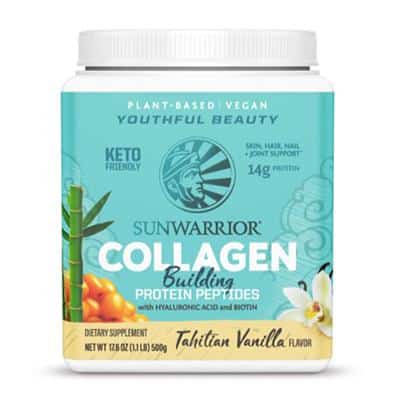
sunwarrior.com
- Protein – 14 (flavored) to 18 (natural) grams per scoop (25 grams)
- Source – Proprietary Beauty Blend (organic fermented pea protein, organic fermented brown rice peptides, organic sea buckthorn berry, organic tremella mushroom extract, organic kale leaf, organic spinach leaf, vitamin C, hyaluronic acid, bamboo leaf extract, organic whole spirulina, organic holy basil leaf extract, organic sunflower seed extract)
- Other Ingredients/Flavors – Organic guar gum, sea salt, organic stevia leaf extract, medium-chain triglycerides from coconut oil, marine algae
- Tahitian Vanilla (organic vanilla flavor)
- Chocolate Fudge (organic Dutch cocoa, organic chocolate flavor)
- Salted Caramel (organic salted caramel flavor, sea salt)
Why buy: For those eager to avoid animal protein, Sunwarrior’s collagen peptides are 100% plant-based and don’t compromise on concentration. You get an impressive 14 to 18 grams of protein per serving, although the fermented pea protein base may cause gassiness for some people. You can also save 20% when you subscribe for recurring shipments.
Best for Chocolate-Lovers – Bulletproof Chocolate Collagen Protein
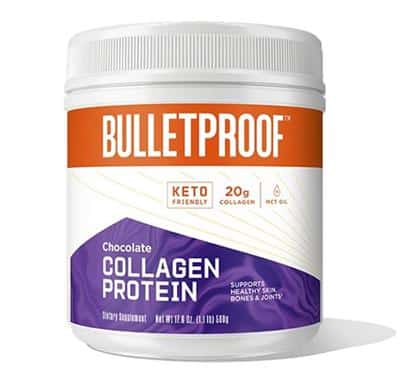
bulletproof.com
- Protein – 19 grams per two scoops (33 grams)
- Source – Hydrolyzed bovine collagen powder
- Other Ingredients – Bulletproof MCT oil powder (caprylic and capric acid triglycerides from highly refined coconut and palm kernel oil, tapioca dextrin), raw cacao powder, coconut creamer powder, erythritol, organic cocoa powder, cellulose gum, Rebaudioside A (refined stevia leaf extract).
Why buy: Bulletproof’s collagen protein comes predominantly from type 1 bovine collagen from cows raised on pasture and without added hormones. The company claims that the repeated enzymatic processing it undergoes ensures maximum bioavailability while the peptides remain intact. One drawback for those who don’t want their supplement to taste like dessert—the powder only comes in a chocolate flavor. Save 10% when you subscribe.
Best Flavors – Sports Research Collagen Peptides
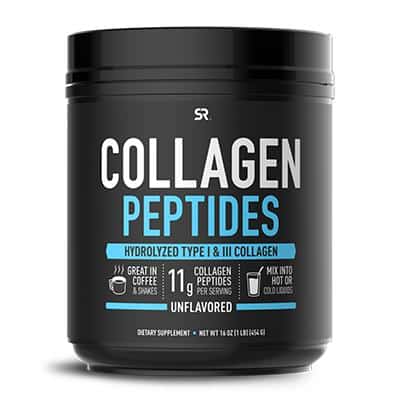
sportsresearch.com
- Protein – 10 grams per scoop (11 grams serving size)
- Source – Hydrolyzed bovine collagen peptides
- Other Ingredients/Flavors –
- Dark Chocolate (cocoa powder, natural flavor, sea salt, stevia leaf extract, monk fruit)
- Vanilla Bean (cocoa powder, natural flavor, sea salt, stevia leaf extract, monk fruit)
- Matcha (organic green tea powder)
Why buy: SR collagen provides you with a concentrated dose of collagen peptides, including a natural flavor option that’s completely free of filler ingredients. This bovine-based collagen is sourced from credible facilities across New Zealand, Australia, South America, and the EU, but is packaged and quality-tested in the United States. Another benefit? It’s possible to purchase single-serving travel packs for extra convenience.
Best Unflavored – Vital Proteins Collagen Peptides
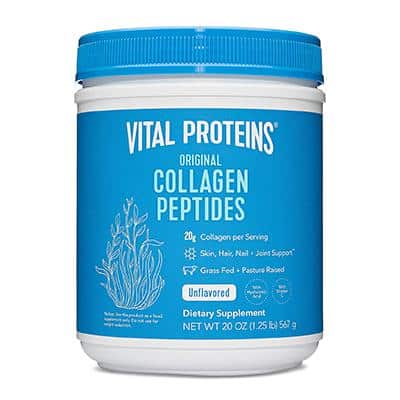
vitalproteins.com
- Protein – 18 grams per two scoops (20 grams serving size)
- Source: Bovine hide collagen peptides
- Other Ingredients/Flavors: Hyaluronic acid (sodium hyaluronate), vitamin C (ascorbic acid)
Why buy: This stripped-down collagen supplement offers nothing but high-quality collagen peptides, vitamin C, and hyaluronic acid that’s sourced from sodium hyaluronate for improved bioavailability. As it’s tasteless on its own, you can add this powder to your favorite beverages without compromising the flavor. Each serving is 90% protein, making it one of the highest concentrated collagen supplements. Subscribe to get a 25% discount.
Most Convenient – Care/of Collagen
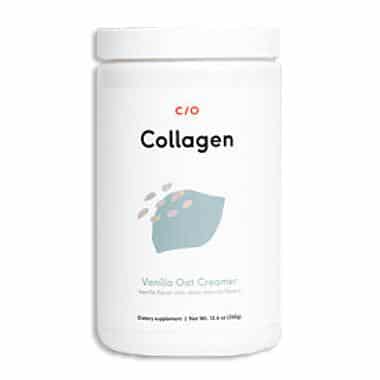
takecareof.com
- Protein – 9 grams per two scoops (10.5 to 24 grams, depending on flavor)
- Source – Grass-fed bovine collagen peptides
- Other Ingredients/Flavors –
- Lemon Passion Fruit (organic maltodextrin, organic lemon juice, organic coconut water powder, organic acacia, organic Isomalto-oligosaccharide (prebiotic fiber), organic passion fruit flavor with other natural flavors, organic monk fruit extract)
- Matcha (organic coconut water powder, organic tapioca maltodextrin, organic monk fruit extract)
- Vanilla Oat Creamer (organic coconut milk powder, organic acacia, organic natural vanilla flavor with other natural flavors, organic vanilla powder, organic medium-chain triglyceride oil (MCT oil), organic tapioca maltodextrin, organic oat flour, organic monk fruit extract, organic isomalto-oligosaccharide (prebiotic fiber)
Why buy: Care/of collagen powder comes from grass-fed cows and contains high-quality flavoring agents like organic vanilla and lemon – no artificial compounds included. This brand offers slightly less protein per serving than other options, which may be a positive for those sensitive to its effects. Just keep in mind that every Care/of purchase enrolls you in an auto-ship program.
The Research on Collagen Supplements
Collagen supplements have many purported benefits. Here’s what the research shows.
Improves Skin
As you age, your body produces less collagen. This leads to dryer skin and the formation of fine lines and wrinkles. Taking collagen supplements may help fill in this gap.
One study found that women who took a daily supplement containing at least 2.5 grams of collagen for eight weeks experienced an increase in skin elasticity and less dryness. Another twelve-week study found that drinking a daily collagen supplement led to significant reductions in wrinkle depth.
Boosts Muscle Mass
Up to 10% of muscle tissue is made from collagen, and this protein is critical for maintaining it.
Research suggests that taking collagen supplements can help you regain the muscle mass lost due to aging. That’s because the peptides may promote the synthesis of creatine and other muscle proteins while stimulating muscle growth after exercise.
For example, a study of over two dozen men who exercised and took 15 grams of collagen per day for three months gained more muscle mass than a group that merely exercised.
Reduces Joint Pain
Your risk of suffering from degenerative joint disorders like osteoporosis increases as you age and your collagen levels start to drop. Taking collagen supplements may stave off the worst symptoms and improve your overall mobility by stimulating your tissues to make more collagen.
For instance, one study found that adults who took two grams of collagen for over two months experienced significant reductions in joint pain and were able to be more physically active than before.
Prevents Bone Loss
Bones require collagen to give them structure and maintain their strength. But, as you age, your bone mass starts to deteriorate, and you become prone to fractures and conditions like osteoporosis. Taking collagen supplements can stave off bone breakdown and help maintain its density.
A study of women who took five grams of collagen a day for a year experienced up to a 7 percent increase in bone mineral density.
Promotes Heart Health
Taking collagen supplements seems to reduce your risk of suffering from heart problems. That’s because collagen strengthens your arteries, which helps blood flow from your heart throughout the body. Too little collagen, and your arteries become weak and less effective, leading to complications like strokes and heart attacks.
While more research is needed to prove its effectiveness, one small study found that adults who took 16 grams of collagen for six months experienced significantly less artery stiffness than before.
How to Choose the Right Collagen Supplement
When shopping for collagen supplements, certain factors should affect your decision. Here’s our advice for comparing brands and interpreting nutrition facts.
What To Look For
Lab Testing
Any time you purchase a supplement, it’s best to determine whether it’s gone through any third-party testing for safety and ingredient purity. The supplement industry is notoriously unregulated, so a brand that’s transparent about what it contains is a selling point.
High Collagen Concentration
Collagen protein supplements vary from 90 percent protein per serving to barely over half. Pay attention to how much of this key ingredient you’re actually ingesting with every dose. Ideally, keep your serving between 2.5 and 15 grams per day.
Where the Collagen Was Sourced
While most collagen powders are derived from animal products (primarily cow bones), some come from plant-based sources like pea protein. That’s an important consideration for anyone following a vegan diet.
Evidence of Filler Ingredients
Collagen powder has minimal taste on its own, so many brands package it with flavoring agents and other filler ingredients to make it more appetizing. Pay attention to these added compounds so you know what you’re really consuming. If you prefer things pure, look for a brand that sells unflavored powder.
How to Use Collagen Powder
You can use collagen protein supplements as you would other protein powders. Most brands suggest you dissolve a scoop or two of powder (whichever the serving size specifies) in your liquid of choice. It’s also possible to incorporate collagen protein powder into baked goods or Jello.
Unflavored powders can be mixed into any food without affecting the taste or texture, while flavored varieties taste best when incorporated into smoothies or treated similar to an instant coffee drink.
Safety and Side Effects
There are few known negative side effects associated with collagen supplements.
Those with sensitive digestive systems may find the protein powder leaves them feeling uncomfortably full or nauseous. Others report the powder can leave an unpleasant taste in their mouths (choosing a flavored variety may solve this problem).
Finally, collagen powder is occasionally made from fish, shellfish, or eggs. Those with allergies to these foods may react to the powder and should avoid any brands that use them.
Takeaway
Collagen is a key compound for healthy functioning, and taking collagen supplements can help you maintain levels as your body slows down its production as you age. This natural form of protein is associated with many health benefits, including better skin hydration, fewer wrinkles, less joint pain, more muscle mass, and better cardiovascular health.
Take time to determine what the best collagen supplements are for your preferences, and you’ll likely benefit from incorporating this natural supplement into your routine.
Lydia Noyes is a freelance writer specializing in health and wellness, food and farming, and environmental topics. When not working against a writing deadline, you can find Lydia outdoors where she attempts to bring order to her 33-acre hobby farm filled with fruit trees, heritage breed pigs, too many chickens to count, and an organic garden that somehow gets bigger every year.

 233k
233k  41k
41k  Subscribe
Subscribe 